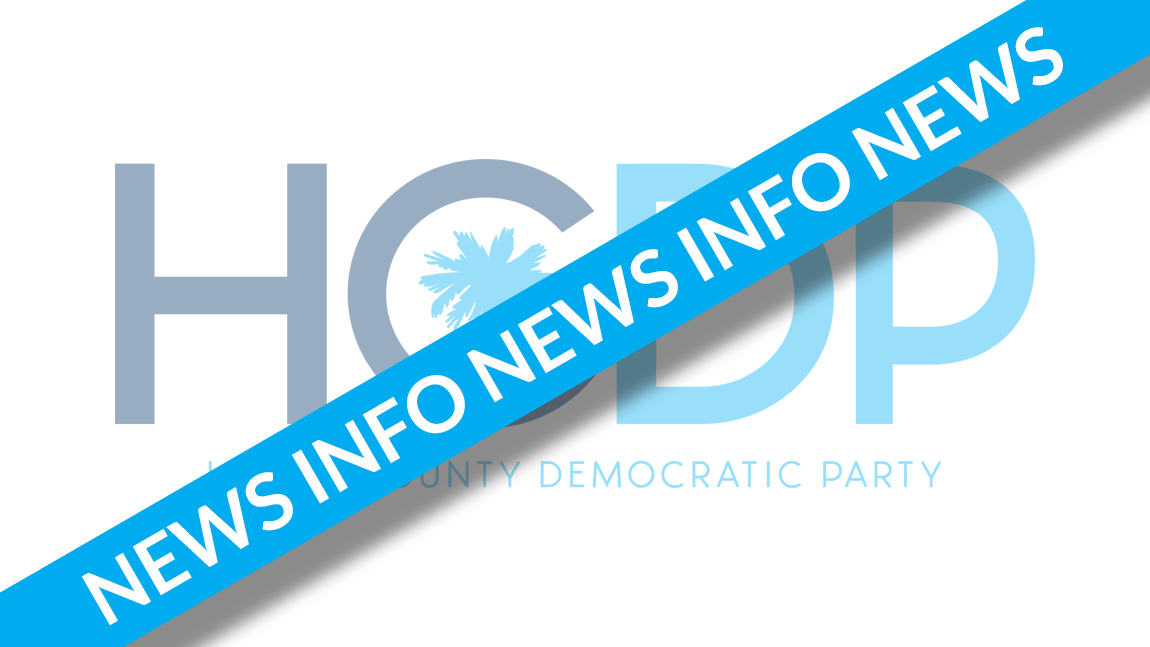Each month The North Strand Democrats Club provides a Legislative and Issues Update compiled by David Higham. HCDP will publish these updates as they are received.
HORRY COUNTY GOVERNMENT
County Public Service Needs: During a budget retreat held last month, Horry County public safety departments itemized the need for more than $10 million in additional staff, raises, equipment and facilities so officials can maintain services for a rapidly growing population. According to county officials, most of these projected expenses will impact the county’s general funds, which come from property taxes. County officials have suggested creating a dedicated tax for public safety services, but recent discussions have focused on using hospitality fee money for some of those needs. However, the Hospitality Fee is currently in litigation between Horry County and the City of Myrtle Beach. Public safety needs will continue to be discussed by the County Council as they prepare next year’s fiscal budget. (Myrtle Beach Herald 1/10/20)
STATE / SC LEGISLATURE
Lawmakers returned to the State House on January 14, 2020, to commence the second regular session of the 123rd South Carolina General Assembly.
Daylight Savings Time: Awaiting the Governor’s signature is S.11 which provides that Daylight Savings Time be followed by South Carolina year-round. However, before the state can secede from the biannual clock resetting, Congress must approve exempting the state from the Uniform Time Act of 1966, the law governing daylight savings. Congress has not shown any interest in providing any state with an exemption except for Hawaii and most of Arizona, which have never participated. Florida, California and Tennessee have passed similar daylight savings-extending bills. (Post and Courier newspaper, 1/17/20; SC Legislature on-line)
SC Election Reform: People registering to vote in South Carolina will no longer be asked to give their full Social Security number under an agreement reached in response to a federal lawsuit from the Democratic Party. State election officials have agreed to let the last four digits suffice on a voter application, prompting a federal judge to dismiss the lawsuit. South Carolina was among just three states seeking all nine numbers on registration forms. (Post and Courier, 1/18/20)
Fetal Heartbeat Bill Stalled: SC Senate Majority Leader Shane Massey has said several times in recent weeks that supporters of the “Fetal Heartbeat Protection from Abortion Act” do not have the votes to counter an expected filibuster, and sees no need to halt debate on other pressing issues before the Senate to bring up the anti-abortion bill. (Post and Courier 1/12/20)
Santee Cooper’s Future: In the next one to two months the Legislature will receive a much-anticipated report from the SC Department of Administration about the potential ramifications of selling state-owned utility Santee Cooper. This report will lay out the pros and cons of three options for dealing with Santee Cooper: Sell Santee Cooper to a for-profit, private or publicly traded company like Dominion; Hire a private firm to run it; Or keep Santee Cooper under state control. The report will lay out the bids from private utilities to either purchase or manage Santee Cooper, as well as examine options for reforming the utility if the state decides not to sell it. Reportedly Governor McMaster and many legislators “lean toward the first option…to wash their hands of this mess”. Recently Santee Cooper racked up $4 billion in debt as a result of the collapse of the V.C. Summer Nuclear plant project. Santee Cooper provides power to nearly 2 million customers in every county in the state. (Statehouse Report 1/10/20; Post and Courier 1/26/20)
Education Reform: Governor McMaster and legislative leaders in both chambers all agree that a pay boost is needed to stem a teacher shortage crisis, although there is disagreement on the amount and how it will be distributed. In addition, House-passed legislation being debated before the full Senate would make changes to teacher preparation, student testing and accountability. The proposed bill would allow failing school districts to be taken over by the State. A takeover could take place if a school or school district is under-performing for three consecutive years, a school’s accreditation is denied, or there is financial mismanagement. The bill proposes funding summer programs for students struggling to read and provides funding for an extra five paid workdays to teachers’ school year they can use to plan. SC for ED, a group which organized a 10,000-person march on the State house last year, has been calling for senators to vote against the bill. They say it will not do anything to help retain teachers. (Post and Courier 1/12/20; The State newspaper 1/22/20))
Governor’s Budget Priorities: With state revenues projected to be $1.8 billion more than what the state had available to spend last year, Gov. McMaster laid out his budget priorities at his third State of the State address before the Legislature. The Governor’s priorities include:
Tax Proposals: McMaster asked for the third year in a row for legislators to get behind exempting the retirement pay of all veterans and first responders from state income taxes. Additional tax proposals include returning $250 million to taxpayers through one-time rebates. According to the Governor’s office, the average household rebate would be $204. In all McMaster is proposing, through rebates and additional tax cuts, to return $430 million to taxpayers in the fiscal year that starts July 1, roughly a quarter of the additional $1.8 billion in taxes legislators will have to spend. McMaster’s announced tax cut plan would cut the top rate by 0.2 percent, the first step of a five-step plan to cut the state’s top income tax rate from 7 percent to 6 percent. McMaster proposed the same plan last year, which the Legislature ignored.
State worker pay: Instead of an across-the-board cost of living raise for the State’s 60,000 employees, McMaster is proposing to split a $33 million pool among all state agencies and let department heads distribute the raises “based on performance, merit, success and longevity”. Another chunk of money, $38 million, would be divided among seven law enforcement agencies to fund worker pay raises.
K-12 Education: The Governor’s recommendations include
- Giving every K-12 teacher an across-the-board $3000 raise. This $213 million expenditure would constitute a second consecutive substantial hike in teacher’s pay. Senate Education Chairman Greg Hembree proposes a bigger boost, at $225 million total, and is proposing that school districts have a larger say on how the pay raises are distributed.
- Provide an additional $125, for $400 total, to teaches to spend on classroom supplies. Teachers often complain they often must pay out of pocket for basic materials.
- Spend $53 million to expand state-paid, full-day 4-year old kindergarten across the state, fulfilling a promise legislator made in 2014, but have yet to fund. This would extend 4K programs to 17 school districts currently not eligible to participate and would serve an additional 15,000 students. (Statehouse Report 1/10/20 – see link under Democratic Response Below)
- Spend $23 million to have a full-time law enforcement officer in every school.
- Spend $50 million for rural career centers where high school students can take courses toward a degree or certificate.
- Spend $1 million for additional school-based, mental health counselors.
Higher Education: McMaster is proposing
- Make college more affordable for in-state students by providing colleges with $26 million to freeze tuition for in-state students for the second consecutive year.
- Spend an additional $3 million to cover tuition costs for SC’s Army and Air National Guard members.
- Spend $162 million to repair aging buildings at SC’s public universities and colleges.
- Increase state aid for need-based scholarships for poor students by $32 million, bringing the total to $54 million.
Prisons: McMaster recommends spending an additional $129 million to upgrade SC prisons. This proposed expenditure represents the largest single investment in upgrades to the prison system in decades.
Democratic Response: House Minority Leader Todd Rutherford gave the official Democratic response to McMaster’s State of the State address. The Columbia Democrat said legislators don’t need to talk about tax breaks while there are so many needs across the state, including bolstering long neglected child welfare services so the state’s most vulnerable stop “dying from abuse and neglect”.
(Post and Courier newspaper, 1/14/20; 1/19/20; 1/20/20; 1/23/20; Statehouse Report 1/10/20)
FEDERAL / US CONGRESS
US – China Trade Deal: The agreement comes after two years of negotiations where American taxpayers spent about $28 Billion in subsidy payments to American farmers. (CNN, 1/15/2020) The so-called Phase 1 Pact de-escalates the trade hostilities between the two countries. The US agreed to drop plans to impose tariffs on an additional $160 billion in Chinese imports and reduced by one-half the existing US tariffs. It leaves in place, however, tariffs on about $360 billion in Chinese imports – a level of protectionism that would have been unthinkable before Trump took office. China also agreed to significantly increase its purchase of American products, including $40 billion a year in US farm products – an ambitious goal for a country that has never imported more than $26 billion a year in US agricultural products. Many of the thornier trade issues between the two countries, such as China’s unfair subsidies for its own companies, was left for future negotiations. (Post and Courier newspaper, 1/15/2020)
United States-Mexico-Canada trade agreement: Congress handed Trump a major victory by clearing the pact which is intended to update the 25-year old NAFTA accord. Democrats and Republicans on Capitol Hill both claimed that the agreement was a significant improvement over the original NAFTA. Speaker Pelosi said the pact is “infinitely better than what was initially proposed by the administration”. Democrats claimed credit for winning stronger provisions on enforcing the agreement. (Post and Courier, 12/11/19)
Law Enacted to raise Tobacco Age: Attached to an end-of-the-year, must pass budget bill, Congress enacted a law to immediately raise the minimum age to purchase all tobacco products, including electronic cigarettes, from 18 to 21 nationwide, a step long sought by health advocates. The bill was supported by some unlikely backers, Marlboro-cigarette maker Altria and vaping giant Juul Labs. Tobacco critics contend the companies support is calculated to head off even harder hitting government action: a ban on all flavored tobacco products. (Post and Courier, 12/18/19)
Robocall Crackdown: Legislation known as the Traced Act was passed by Congress to require phone companies to offer free call-blocking apps and verify that the number calling you is real and not fake to make it look like it’s coming from the IRS or others to trick consumers. Maureen Mahoney from Consumer Reports said the measure was an important step, though “robocalls are not going to disappear overnight”. (Post and Courier, 12/20/19)
Prescription Drug legislation gains House approval: The bill was passed largely along party-lines. It would allow the federal government to negotiate lower prices for prescription drugs. Senate Republican Leader McConnell has vowed to block it. Trump is supporting a more modest bill that does not include a provision to negotiate prices. (The Hill newspaper, 12/12/19) Earlier this month manufacturers increased the list prices on 457 brand name drugs by an average of 5.1%. (CNN, 1/5/2020)
U.S. Space Force Launched: Congress approved the creation of the US Space Force, the first new military service in more than 70 years. It is intended to more effectively defend US interests in space, especially satellites used for navigation and communication. Congress rejected the Trump Administration’s desire to make the Space Force a separate military department. It will instead be administered by the Secretary of the Air Force. (Post and Courier, 12/21/19)
THE COURTS
Refugees: A federal judge temporarily blocked a Trump Administration order that allowed state and local governments to refuse the resettling of refugees, finding the policy likely “unlawful”. The Trump’s executive order required state and local governments to affirmatively consent, by a deadline of January 21, 2020, to the receiving of refugees. According to an NBC report, “the wording means politicians would have to take a potentially unpopular position in favor of immigrants. If states, cities and counties take no action by January 21, funding for refugees will be cut off, meaning there will be no resettlements there.” According to a January 10 news report, governors of 41 states have opted to accept refugees, including 18 led by Republican governors. According to Dan Darling of the Southern Baptist Convention, the unexpected support for refugees is due to the influence of religious groups, especially evangelical leaders. (NBC News 1/10/20; 1/15/20)





